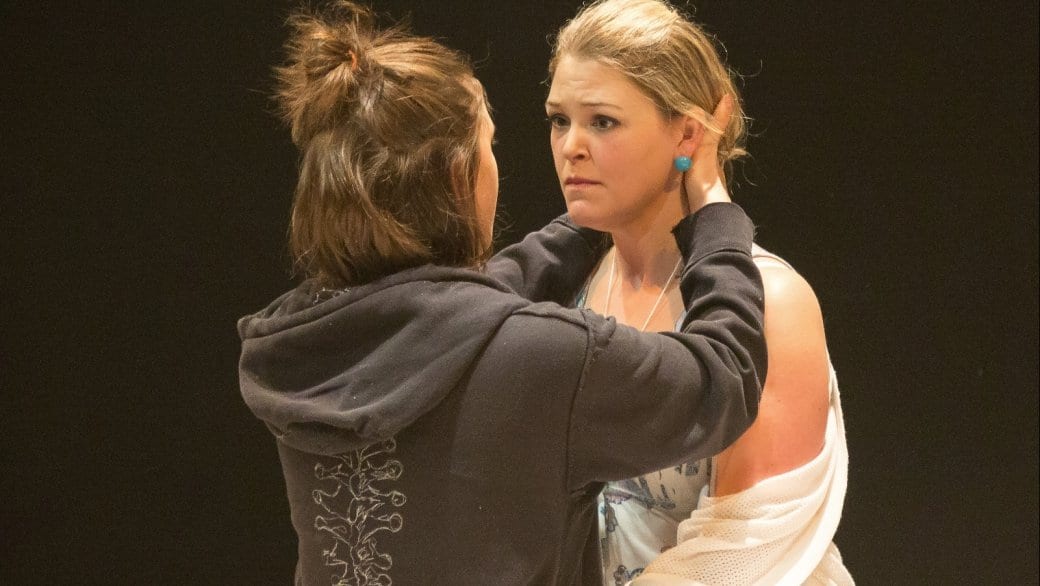Fear, anxiety, hopelessness and lust: the millennials in Sean Harris Oliver’s Bright Blue Future are grappling with their uncertain futures.
Among the anxieties represented on stage, Arianna (Genevieve Fleming) hasn’t come out to her religious parents, much to the chagrin of her girlfriend Alexandra (Rachel Cairns).
Arianna is afraid her parents will reject her — and pull the financial plug. But Alexandra is growing increasingly frustrated with their stagnant relationship.
Oliver, who is straight, says he based Arianna’s struggle on some of the struggles he’s witnessed among his queer peers, then dialed up the stakes until coming out to her parents meant losing her income, her home and her support system.
Daily Xtra wanted to know if Arianna’s coming-out fears ring true with queer millennials off-stage.
For 24-year-old Jacquie Shaw, who saw Bright Blue Future on opening night, the real and ongoing challenge is coming out to yourself and accepting your own sexuality; coming out to family afterward seems less critical.
“I think that Arianna not coming out is her being afraid that she’s a full fuck-up, and dealing with that,” says Shaw, who uses the gender-neutral pronoun they.
Shaw thinks many people still struggle to accept their sexuality when they’re queer; the role played by religion in Arianna’s case doesn’t help. “It plays into the stigma that like, you’ve fucked up because you’re queer. But also, her parents are Catholic, so I think there’s a lot there in that relationship.”
Shaw came out to their mother at 14, but didn’t date through high school, then dated a man for six years. Though both Shaw and their boyfriend identified as queer, they faced a lot of erasure over the perceived straightness of their relationship. Following their breakup, Shaw found they had to go through the process of coming out all over again.
“I think a lot of the time the queer narrative is, “I’ve known since I was a small kid.” And of course you’ve known, there’s been hints, but there’s a moment where, as there is with any part of your identity, you have to sit down and you realize: this is the kind of person I am.”

(Is Alexandra, left, wrong to pressure her girlfriend Arianna to come out?/Hardline Productions/Mark Halliday photo)
Shaw hasn’t come out a second time to their parents — “but I feel like I shouldn’t have to do that. I think the whole process of coming out to other people, the necessity to come out, is a strange requirement to being queer, to being part of not-heteronormative culture.”
“That stance I have on coming out often comes off as if I’m insecure,” Shaw says, “but all my friends know, people who know me in passing know. I don’t feel like I don’t celebrate my queerness; I just don’t feel like I have to put such a priority on it.”
Mikey Gabriana, 25, hasn’t come out to his parents either.
“I grew up not knowing how my sexuality would affect other people,” Gabriana says, reflecting on Arianna’s situation in the play. “I’m not out to my parents. A part of me feels like they know, and a part of me feels like they would accept it, but the majority of what I feel is that they will be upset.”
Gabriana remembers hearing his dad yelling at the television when gay people were featured. He also remembers the conversations his Roman Catholic parents would have while he sat in the room, listening in. It put a lot of pressure on him to stay closeted while he still lived at home. He eventually came out to his sister over MSN when he was 17.
“I wanted to have someone support me who was family,” he says.
His sister never followed up with him. He still hasn’t come out to his parents. He’s not sure he needs to now.
“I have the intentions of coming out, but I’m not in any hurry,” Gabriana says. The community he’s built since moving out and living on his own for the last five years gives him more than enough support. He’s not closeted but he doesn’t feel the need to sit anyone down to formally come out, he says.
Shawn Macdonald, the gay director of Bright Blue Future, says coming out is still a complicated process for many youth, despite the advances made in society.
“We assume that because of that evolution, the lives of young people, especially in the coming out process, it’s somehow easier and quicker and there’s less trauma involved,” Macdonald says. “I think [what] this play reminds us of is that coming out continues to be something that challenges us all.”
Bright Blue Future
Runs until Saturday, March 5, 2016.
Pacific Theatre, 1440 W 12th Ave, Vancouver
hardlineproductions.ca/brightblue.html

 Why you can trust Xtra
Why you can trust Xtra


